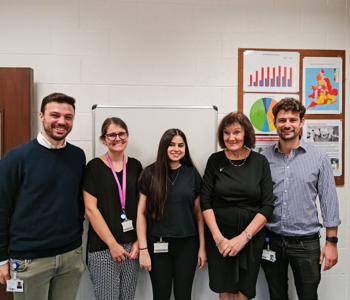Published: 11 February 2023

Class of 2022 Biomedical Science alumna, Javeria Nishtar, took part in the Equal Representation in Academia (ERA) programme in the final year of her course. Here, she shares her experience on the programme and her ambitions for the future.
ERA, an initiative which is part-funded by alumni donations, aims to raise awareness of academic research careers for students from underrepresented backgrounds and thereby facilitate the academic career path for those wanting to follow this route. It provides opportunities for students to attend placements, helping them gain valuable insight into careers in research and industry and is open to undergraduate students on any degree programme.
(Pictured left to right: Former St George's Research Fellow Dr Davide Radaelli, Senior Research Technician Emilia Zullo, Javeria Nishtar, Professor of Cardiac Pathology Mary Sheppard, and Clinical Lecturer in Histopathology Dr Joseph Westaby).
Javeria learnt a range of valuable skills for her future career through ERA, and discovered the importance of collaboration in the efficient running of a lab:
I was working in small lab, where everyone contributed to its running. Throughout my time there, I came to appreciate how everyone worked together to ensure that the lab was running optimally.
- Javeria -
After graduating, she spent time working at the lab where she carried out her ERA placement and now hopes to apply for a PhD to work towards a career in Academia.
Speaking about the how ERA helped prepare her for her future career, Javeria says: “ERA has enabled me to gain essential skills, from lab techniques to how to write an effective paper, and presentation skills.
The programme has made me challenge myself, and helped me understand what I do, and don’t, want to do in the future. It has definitely given me more clarity on what a career in academia would look like and the many steps towards it!
- Javeria -
Reflecting on why she applied for ERA, she adds: “When I entered my first university lecture, surrounded by faces from different cultures and countries, I was six thousand miles from home. I didn't feel as though this diversity translated to the teaching staff at St George's.
Through my education, I’ve learned how important it is to see role models that look like you, come from similar backgrounds, or have stories we can relate to. I had hopes to become a professor someday, and to get more women from underrepresented backgrounds interested in the world of science.
- Javeria -
“I also wanted help make science accessible to those who didn’t study or work in the field, because published research is not always communicated to the general public in a way that makes it accessible. It can be difficult for someone without a background in STEM to understand research presented without context - something which can contribute to misinformation among the public."
I hope to open a wider conversation, and to work on a publication with pieces which interest a wider range of audiences. I wanted ERA to be a stepping stone in achieving my goals, as well as a way to make science more accessible for people all over the world.
- Javeria -
“ERA has opened new avenues for me, not only in terms of learning, but also making connections. The Cardiac Risk in the Young lab had visiting scientists from different countries who were seamlessly bought into the lab and given tasks and important roles. Everyone had a chance to contribute to meetings and was given the tools to progress in their work.
“I had the opportunity to work with people from all over the world at different stages of their career and it gave me a wider perspective."
These kinds of initiatives are so important, especially in marginalised communities. I would like to express my genuine appreciation for all the alumni who helped fund it! I will always look at my ERA experience as a positive one.”
- Javeria -
Find out more about ERA.